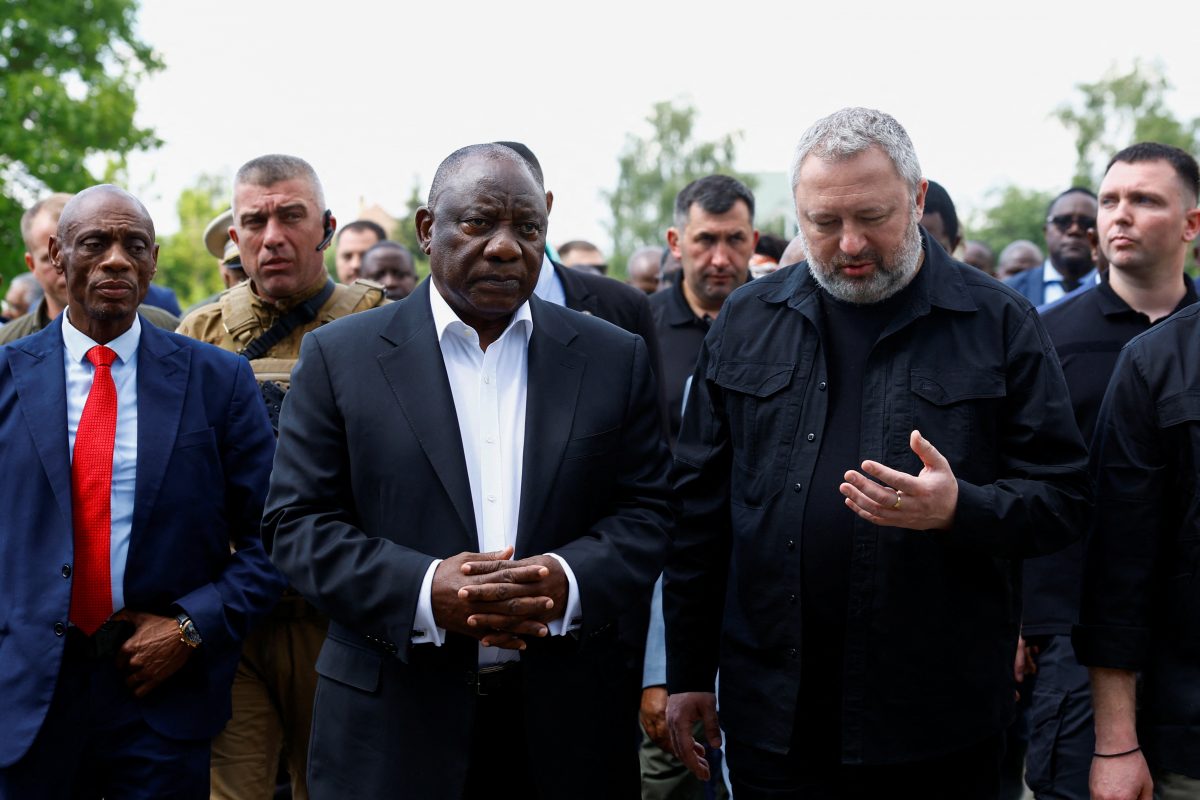KYIV, (Reuters) – A delegation of African leaders began a peace mission in Kyiv today, undeterred by what Ukraine said was a volley of Russian missiles intended to greet them in the capital.
At least two explosions rocked the capital but mayor Vitali Klitschko said they were caused by air defences. He reported no deaths or big damage in the city but emergency services said four people, including a child, were hurt in the Kyiv region.
The peace delegation, including leaders from South Africa, Senegal, Zambia, the Comoros and Egypt, met defence ministry representatives ahead of talks planned later today with President Volodymyr Zelenskiy.
The leaders are due to meet Russian President Vladimir Putin in St Petersburg on Saturday and, with Kyiv and Moscow courting the Global South, see a chance to mediate in a war that has hit African countries by disrupting grain and other food supplies.
“The mission is proceeding well and as planned,” the South African presidency said on Twitter after the air strike.
The leaders are seeking agreement on a series of “confidence building measures”, but Kyiv has said its own peace initiative must be the basis of any settlement and has launched a counteroffensive to push back Russian occupying forces.
The Kremlin, which invaded Ukraine in February 2022, has played down the chances of meaningful peace talks with Kyiv. It says conditions for a peace process are not in place, but that it is ready to listen and is open to outside initiatives.
The African leaders, including South African President Cyril Ramaphosa and Senegalese President Macky Sall, began their trip by visiting the town of Bucha, outside Kyiv. Ukraine says Russian occupiers carried out executions, rapes and torture in Bucha, and international investigators are collecting evidence of war crimes. Russia denies the allegations.
LEADERS HEAD FOR AIR-RAID SHELTER
Air sirens later blared in Kyiv and Reuters saw the leaders heading into a hotel in the capital to use its air-raid shelter.
Ukraine’s air force said it downed six “Kinzhal” ballistic missiles, six cruise missiles and two drones.
“Russian missiles are a message to Africa: Russia wants more war, not peace,” Ukrainian Foreign Minister Dmytro Kuleba wrote on Twitter.
Andriy Yermak, head of the presidential staff, said: “Whenever a high-ranking foreign delegation visits Ukraine, Russia greets it with a missile attack on our peaceful cities.”
Russia did not immediately comment on the events in Kyiv. It has said its air strikes are aimed against military and other infrastructure, though civilians have often been killed.
A draft framework document seen by Reuters says the objective of the African leaders’ mission is to promote peace and encourage the parties to agree to a diplomacy-led process.
Those measures could include a pullback of Russian troops, removal of Russian tactical nuclear weapons from Belarus, suspension of implementation of an International Criminal Court arrest warrant targeting Putin, and relief from the Western sanctions imposed on Russia, it indicated.
An agreement on cessation of hostilities could follow, and would need to be accompanied by negotiations between Russia and the West, the document stated.
African countries have been hit hard by the fallout from the war, which has aggravated food price inflation and worsened existing hunger crises.
A Black Sea grain export deal has helped alleviate some of that pressure, though Russia has suggested it might quit the agreement. Among the measures that could be proposed by the African leaders in the first stage of their engagement was an “unconditional grain and fertiliser deal”.






